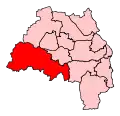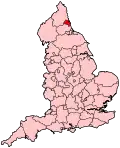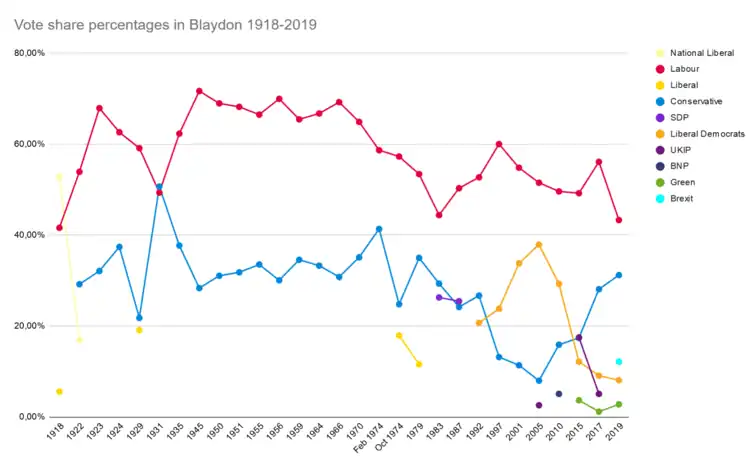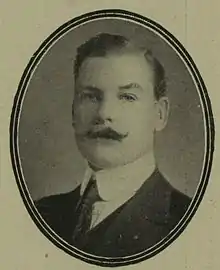Blaydon (UK Parliament constituency)
Blaydon is a constituency[n 1] represented in the House of Commons since 2017 by Liz Twist of the Labour Party.[n 2]
| Blaydon | |
|---|---|
| Borough constituency for the House of Commons | |
 Boundary of Blaydon in Tyne and Wear | |
 Location of Tyne and Wear within England | |
| County | Tyne and Wear |
| Population | 88,281 (2011 census)[1] |
| Electorate | 68,156 (December 2010)[2] |
| Major settlements | Birtley, Blaydon, Rowlands Gill, Ryton and Whickham |
| Current constituency | |
| Created | 1918 |
| Member of Parliament | Liz Twist (Labour) |
| Seats | One |
| Created from | Chester-le-Street and Hexham |
The seat is due to be abolished for the next general election.[3]
Constituency profile
The seat has been a safe seat for the Labour Party since 1935.
Historically the area's economy relied on coal mining from the Victorian period until the decline of mining in the latter half of the 20th century.
Today the economy is supported by engineering and service industries on Tyneside, and agriculture. It also includes the Metrocentre, the second-largest shopping centre in the UK.
The constituency is on the western upland outskirts of Gateshead and its communities are separated by green buffers. It currently comprises the towns of Blaydon, Whickham, Ryton, Birtley and surrounding villages in the south and west of the Metropolitan Borough of Gateshead.
Boundaries
1918–1950
- The Urban Districts of Blaydon, Ryton, Tanfield, and Whickham.[4]
Blaydon was created under the Representation of the People Act 1918 for the 1918 general election when Blaydon, Ryton and Whickham were split off from the existing Chester-le-Street seat. Tanfield was added from the abolished constituency of North West Durham.
1983–2010
- The Borough of Gateshead wards of Birtley, Blaydon, Chopwell and Rowlands Gill, Crawcrook and Greenside, Lamesley, Ryton, Whickham North, Whickham South, and Winlaton.[6][7]
The communities of Birtley and Lamesley were transferred in from the abolished constituency of Chester-le-Street. Lost small area in the east of the seat to the new constituency of Tyne Bridge.
2010–present
- The Borough of Gateshead wards of Birtley, Blaydon, Chopwell and Rowlands Gill, Crawcrook and Greenside, Dunston Hill and Whickham East, Lamesley, Ryton, Crookhill and Stella, Whickham North, Whickham South and Sunniside, and Winlaton and High Spen.[8]
Minor changes resulting from the redrawing of ward boundaries in Gateshead Borough and abolition of Tyne Bridge.
Proposed abolition
Further to the completion of the 2023 Periodic Review of Westminster constituencies, the seat will be abolished for the next general election, with its contents distributed to three new constituencies:[3]
- The three wards incorporating the town of Whickham included in an expanded Gateshead constituency named Gateshead Central and Whickham
- Birtley and Lamesley combined with Washington to form Washington and Gateshead South
- Remaining wards (comprising about half the electorate), including the communities of Blaydon, Rowlands Gill and Ryton, to form a cross-county constituency with Consett in County Durham - named Blaydon and Consett
Members of Parliament
Elections

Elections in the 2010s
| Party | Candidate | Votes | % | ±% | |
|---|---|---|---|---|---|
| Labour | Liz Twist | 19,794 | 43.3 | −12.8 | |
| Conservative | Adrian Pepper | 14,263 | 31.2 | +3.1 | |
| Brexit Party | Michael Robinson | 5,833 | 12.8 | New | |
| Liberal Democrats | Vicky Anderson | 3,703 | 8.1 | −1.0 | |
| Green | Diane Cadman | 1,279 | 2.8 | +1.6 | |
| Liberal | Kathy King | 615 | 1.3 | New | |
| Space Navies Party | Lisabela Marschild | 118 | 0.3 | +0.1 | |
| Independent | Lee Garrett | 76 | 0.2 | New | |
| Majority | 5,531 | 12.1 | −15.9 | ||
| Turnout | 45,681 | 67.3 | −2.9 | ||
| Labour hold | Swing | −8.0 | |||
| Party | Candidate | Votes | % | ±% | |
|---|---|---|---|---|---|
| Labour | Liz Twist | 26,979 | 56.1 | +6.9 | |
| Conservative | Tom Smith | 13,502 | 28.1 | +10.6 | |
| Liberal Democrats | Jonathan Wallace | 4,366 | 9.1 | −3.1 | |
| UKIP | Ray Tolley | 2,459 | 5.1 | −12.4 | |
| Green | Paul McNally | 583 | 1.2 | −2.5 | |
| Libertarian | Michael Marchetti[14] | 114 | 0.2 | New | |
| Space Navies Party | Lisabela Marschild | 81 | 0.2 | New | |
| Majority | 13,477 | 28.0 | -3.7 | ||
| Turnout | 48,084 | 70.2 | +4.0 | ||
| Labour hold | Swing | -1.85 | |||
| Party | Candidate | Votes | % | ±% | |
|---|---|---|---|---|---|
| Labour | Dave Anderson | 22,090 | 49.2 | -0.6 | |
| UKIP | Mark Bell | 7,863 | 17.5 | New | |
| Conservative | Alison Griffiths | 7,838 | 17.4 | +1.5 | |
| Liberal Democrats | Jonathan Wallace | 5,497 | 12.2 | -17.1 | |
| Green | Paul McNally[16] | 1,648 | 3.7 | New | |
| Majority | 14,227 | 31.7 | +11.4 | ||
| Turnout | 44,936 | 66.2 | 0.0 | ||
| Labour hold | Swing | -9.0 | |||
| Party | Candidate | Votes | % | ±% | |
|---|---|---|---|---|---|
| Labour | Dave Anderson | 22,297 | 49.6 | −1.9 | |
| Liberal Democrats | Neil Bradbury | 13,180 | 29.3 | −8.5 | |
| Conservative | Glenn Hall | 7,159 | 15.9 | +7.9 | |
| BNP | Keith McFarlane | 2,277 | 5.1 | New | |
| Majority | 9,117 | 20.3 | +6.6 | ||
| Turnout | 44,913 | 66.2 | +4.0 | ||
| Labour hold | Swing | −4.5 | |||
Elections in the 2000s
| Party | Candidate | Votes | % | ±% | |
|---|---|---|---|---|---|
| Labour | David Anderson | 20,120 | 51.5 | −3.3 | |
| Liberal Democrats | Peter J. Maughan | 14,785 | 37.9 | +4.1 | |
| Conservative | Dorothy Luckhurst | 3,129 | 8.0 | −3.4 | |
| UKIP | Norman R. Endacott | 1,019 | 2.6 | New | |
| Majority | 5,335 | 13.7 | -7.3 | ||
| Turnout | 39,053 | 62.6 | +5.2 | ||
| Labour hold | Swing | −3.7 | |||
| Party | Candidate | Votes | % | ±% | |
|---|---|---|---|---|---|
| Labour | John McWilliam | 20,340 | 54.8 | −5.2 | |
| Liberal Democrats | Peter J. Maughan | 12,531 | 33.8 | +10.0 | |
| Conservative | Mark A. Watson | 4,215 | 11.4 | −1.8 | |
| Majority | 7,809 | 21.0 | -15.2 | ||
| Turnout | 37,086 | 57.4 | −13.6 | ||
| Labour hold | Swing | ||||
Elections in the 1990s
| Party | Candidate | Votes | % | ±% | |
|---|---|---|---|---|---|
| Labour | John McWilliam | 27,535 | 60.0 | +7.3 | |
| Liberal Democrats | Peter J. Maughan | 10,930 | 23.8 | +3.1 | |
| Conservative | Mark A. Watson | 6,048 | 13.2 | -13.5 | |
| Independent | Richard J. Rook | 1,412 | 3.1 | New | |
| Majority | 16,605 | 36.2 | +10.2 | ||
| Turnout | 45,925 | 71.0 | -6.7 | ||
| Labour hold | Swing | ||||
| Party | Candidate | Votes | % | ±% | |
|---|---|---|---|---|---|
| Labour | John McWilliam | 27,028 | 52.7 | +2.4 | |
| Conservative | Peter Pescod | 13,685 | 26.7 | +2.5 | |
| Liberal Democrats | Paul Nunn | 10,602 | 20.7 | −4.8 | |
| Majority | 13,343 | 26.0 | +1.1 | ||
| Turnout | 51,315 | 77.7 | +2.0 | ||
| Labour hold | Swing | −0.1 | |||
Elections in the 1980s
| Party | Candidate | Votes | % | ±% | |
|---|---|---|---|---|---|
| Labour | John McWilliam | 25,277 | 50.3 | +5.9 | |
| SDP | Paul Nunn | 12,789 | 25.5 | -0.8 | |
| Conservative | Peter Pescod | 12,147 | 24.2 | -5.1 | |
| Majority | 12,488 | 24.8 | +9.7 | ||
| Turnout | 50,213 | 75.7 | +2.5 | ||
| Labour hold | Swing | ||||
| Party | Candidate | Votes | % | ±% | |
|---|---|---|---|---|---|
| Labour | John McWilliam | 21,285 | 44.4 | -9.0 | |
| Conservative | A. Williams | 14,063 | 29.3 | -5.7 | |
| SDP | M. Carr | 12,607 | 26.3 | New | |
| Majority | 7,222 | 15.1 | -3.3 | ||
| Turnout | 47,955 | 73.2 | -5.9 | ||
| Labour hold | Swing | -1.7 | |||
Elections in the 1970s
| Party | Candidate | Votes | % | ±% | |
|---|---|---|---|---|---|
| Labour | John McWilliam | 24,687 | 53.40 | ||
| Conservative | T. Middleton | 16,178 | 35.00 | ||
| Liberal | David Hutton | 5,364 | 11.60 | ||
| Majority | 8,509 | 18.40 | |||
| Turnout | 46,229 | 79.07 | |||
| Labour hold | Swing | ||||
| Party | Candidate | Votes | % | ±% | |
|---|---|---|---|---|---|
| Labour | Robert Woof | 23,743 | 57.27 | ||
| Conservative | A.A. Craig | 10,277 | 24.79 | ||
| Liberal | Paul Barker | 7,439 | 17.94 | New | |
| Majority | 13,466 | 32.48 | |||
| Turnout | 41,409 | 69.20 | |||
| Labour hold | Swing | ||||
| Party | Candidate | Votes | % | ±% | |
|---|---|---|---|---|---|
| Labour | Robert Woof | 22,279 | 58.65 | ||
| Conservative | A.A. Craig | 15,705 | 41.35 | ||
| Majority | 6,574 | 17.30 | |||
| Turnout | 37,984 | 67.25 | |||
| Labour hold | Swing | ||||
| Party | Candidate | Votes | % | ±% | |
|---|---|---|---|---|---|
| Labour | Robert Woof | 25,724 | 64.88 | ||
| Conservative | Norman H. D'Aguiar | 13,926 | 35.12 | ||
| Majority | 11,798 | 29.76 | |||
| Turnout | 39,650 | 72.30 | |||
| Labour hold | Swing | ||||
Elections in the 1960s
| Party | Candidate | Votes | % | ±% | |
|---|---|---|---|---|---|
| Labour | Robert Woof | 26,629 | 69.21 | ||
| Conservative | Bernard Bligh | 11,849 | 30.79 | ||
| Majority | 14,780 | 38.42 | |||
| Turnout | 38,478 | 77.45 | |||
| Labour hold | Swing | ||||
| Party | Candidate | Votes | % | ±% | |
|---|---|---|---|---|---|
| Labour | Robert Woof | 25,926 | 66.72 | ||
| Conservative | Neville Cooper Bailey | 12,932 | 33.28 | ||
| Majority | 12,994 | 33.44 | |||
| Turnout | 38,858 | 80.01 | |||
| Labour hold | Swing | ||||
Elections in the 1950s
| Party | Candidate | Votes | % | ±% | |
|---|---|---|---|---|---|
| Labour | Robert Woof | 25,969 | 65.43 | ||
| Conservative | Godfrey William Iredell | 13,719 | 34.57 | ||
| Majority | 12,250 | 30.86 | |||
| Turnout | 39,688 | 82.94 | |||
| Labour hold | Swing | ||||
| Party | Candidate | Votes | % | ±% | |
|---|---|---|---|---|---|
| Labour | Robert Woof | 18,791 | 69.94 | +3.47 | |
| Conservative | John Morley Reay-Smith | 8,077 | 30.06 | -3.47 | |
| Majority | 10,714 | 39.88 | +6.94 | ||
| Turnout | 26,868 | ||||
| Labour hold | Swing | -3.4 | |||
| Party | Candidate | Votes | % | ±% | |
|---|---|---|---|---|---|
| Labour | William Whiteley | 25,273 | 66.47 | ||
| Conservative | John Morley Reay-Smith | 12,750 | 33.53 | ||
| Majority | 12,523 | 32.94 | |||
| Turnout | 38,023 | 80.66 | |||
| Labour hold | Swing | ||||
| Party | Candidate | Votes | % | ±% | |
|---|---|---|---|---|---|
| Labour | William Whiteley | 28,337 | 68.18 | ||
| Conservative | Charles Percy Lawler Satchwell | 13,223 | 31.82 | ||
| Majority | 15,114 | 36.36 | |||
| Turnout | 41,560 | 87.60 | |||
| Labour hold | Swing | ||||
| Party | Candidate | Votes | % | ±% | |
|---|---|---|---|---|---|
| Labour | William Whiteley | 28,343 | 68.94 | ||
| Conservative | Leslie Frances Lawson | 12,772 | 31.06 | ||
| Majority | 15,571 | 37.88 | |||
| Turnout | 41,115 | 87.46 | |||
| Labour hold | Swing | ||||
Election in the 1940s
| Party | Candidate | Votes | % | ±% | |
|---|---|---|---|---|---|
| Labour | William Whiteley | 29,931 | 71.65 | ||
| Conservative | Edward Charles Peake | 11,842 | 28.35 | ||
| Majority | 18,089 | 43.30 | |||
| Turnout | 41,773 | 79.70 | |||
| Labour hold | Swing | ||||
Elections in the 1930s
| Party | Candidate | Votes | % | ±% | |
|---|---|---|---|---|---|
| Labour | William Whiteley | 24,148 | 62.29 | ||
| Conservative | Charles Edwin Vickery | 14,622 | 37.71 | ||
| Majority | 9,526 | 24.58 | N/A | ||
| Turnout | 38,770 | 80.76 | |||
| Labour gain from Conservative | Swing | ||||
| Party | Candidate | Votes | % | ±% | |
|---|---|---|---|---|---|
| Conservative | Thomas Martin | 18,927 | 50.66 | ||
| Labour | William Whiteley | 18,431 | 49.34 | ||
| Majority | 496 | 1.32 | N/A | ||
| Turnout | 37,358 | 80.95 | |||
| Conservative gain from Labour | Swing | ||||
Elections in the 1920s
| Party | Candidate | Votes | % | ±% | |
|---|---|---|---|---|---|
| Labour | William Whiteley | 21,221 | 59.1 | -3.5 | |
| Unionist | R. Charles White | 7,847 | 21.8 | -15.6 | |
| Liberal | Thomas Magnay | 6878 | 19.1 | New | |
| Majority | 13,374 | 37.3 | +12.1 | ||
| Turnout | 35,946 | 79.5 | +2.5 | ||
| Registered electors | 45,204 | ||||
| Labour hold | Swing | +6.0 | |||
| Party | Candidate | Votes | % | ±% | |
|---|---|---|---|---|---|
| Labour | William Whiteley | 17,670 | 62.6 | −5.3 | |
| Unionist | George Denson | 10,549 | 37.4 | +5.3 | |
| Majority | 7,121 | 25.2 | −10.6 | ||
| Turnout | 28,219 | 77.0 | +14.9 | ||
| Registered electors | 36,646 | ||||
| Labour hold | Swing | −5.3 | |||
| Party | Candidate | Votes | % | ±% | |
|---|---|---|---|---|---|
| Labour | William Whiteley | 15,073 | 67.9 | +14.0 | |
| Unionist | George Denson | 7,124 | 32.1 | +2.9 | |
| Majority | 7,949 | 35.8 | +11.1 | ||
| Turnout | 22,197 | 62.1 | −14.9 | ||
| Registered electors | 35,764 | ||||
| Labour hold | Swing | +5.6 | |||
| Party | Candidate | Votes | % | ±% | |
|---|---|---|---|---|---|
| Labour | William Whiteley | 14,722 | 53.9 | +12.3 | |
| Unionist | Sir Frank Robert Simpson, 1st Baronet | 7,963 | 29.2 | New | |
| National Liberal | Frederick William Cook | 4,606 | 16.9 | -35.9 | |
| Majority | 6,759 | 24.7 | N/A | ||
| Turnout | 27,291 | 77.0 | +19.6 | ||
| Registered electors | 35,434 | ||||
| Labour gain from National Liberal | Swing | N/A | |||
Elections in the 1910s

| Party | Candidate | Votes | % | ±% | |
|---|---|---|---|---|---|
| C | National Liberal | Walter Waring | 9,937 | 52.8 | |
| Labour | William Whiteley | 7,844 | 41.6 | ||
| Liberal | Thomas George Graham | 1,064 | 5.6 | ||
| Majority | 2,093 | 11.2 | |||
| Turnout | 18,845 | 57.4 | |||
| National Liberal win (new seat) | |||||
| C indicates candidate endorsed by the coalition government. | |||||
See also
Notes
- A borough constituency (for the purposes of election expenses and type of returning officer)
- As with all constituencies, the constituency elects one Member of Parliament (MP) by the first past the post system of election at least every five years.
References
- "Blaydon: Usual Resident Population, 2011". Neighbourhood Statistics. Office for National Statistics. Archived from the original on 3 March 2016. Retrieved 31 January 2015.
- "Electorate Figures – Boundary Commission for England". 2011 Electorate Figures. Boundary Commission for England. 4 March 2011. Archived from the original on 6 November 2010. Retrieved 13 March 2011.
- "The 2023 Review of Parliamentary Constituency Boundaries in England – Volume one: Report – North East | Boundary Commission for England". boundarycommissionforengland.independent.gov.uk. Retrieved 18 July 2023.
- Craig, Fred W. S. (1972). Boundaries of parliamentary constituencies 1885-1972;. Chichester: Political Reference Publications. p. 10. ISBN 0-900178-09-4. OCLC 539011.
- Craig, Fred W. S. (1972). Boundaries of parliamentary constituencies 1885-1972;. Chichester: Political Reference Publications. pp. 58, 129. ISBN 0-900178-09-4. OCLC 539011.
- "The Parliamentary Constituencies (England) Order 1983" (PDF). p. 74.
- "The Parliamentary Constituencies (England) Order 1995". In the County of Tyne and Wear.
- "The Parliamentary Constituencies (England) Order 2007". In Tyne and Wear.
- Leigh Rayment's Historical List of MPs – Constituencies beginning with "B" (part 3)
- "UK Parliamentary election: Blaydon constituency. Statement of Persons Nominated and Notice of Poll" (PDF). Gateshead Council. 14 November 2019. Archived (PDF) from the original on 15 April 2021. Retrieved 15 November 2019.
- "Commons Briefing Paper 8749. General Election 2019: results and analysis" (PDF). London: House of Commons Library. 28 January 2020. Archived (PDF) from the original on 18 November 2021. Retrieved 19 January 2022.
- "Blaydon parliamentary constituency - Election 2017". BBC News. 9 June 2017. Archived from the original on 20 May 2017. Retrieved 9 June 2017.
- "Commons Briefing Paper 7979. General Election 2017: results and analysis" (PDF) (Second ed.). House of Commons Library. 29 January 2019 [7 April 2018]. Archived (PDF) from the original on 12 November 2019.
- "LPUK Michael Marchetti". www.facebook.com. Archived from the original on 4 April 2022. Retrieved 10 May 2017.
- "Blaydon - Election Results | General Elections Online". Archived from the original on 8 June 2015.
- "Greens name election candidates". The Northern Echo. Archived from the original on 4 February 2015. Retrieved 4 February 2015.
- "Election Data 2010". Electoral Calculus. Archived from the original on 26 July 2013. Retrieved 17 October 2015.
- "Parliamentary Election Thursday, 6 May 2010: Blaydon Constituency. Statement As To Persons Nominated And Notice Of Poll" (PDF). Gateshead Council. 20 April 2010. Archived from the original (PDF) on 15 June 2011. Retrieved 3 May 2010.
- "Election Data 2005". Electoral Calculus. Archived from the original on 15 October 2011. Retrieved 18 October 2015.
- "Election Data 2001". Electoral Calculus. Archived from the original on 15 October 2011. Retrieved 18 October 2015.
- "Election Data 1997". Electoral Calculus. Archived from the original on 15 October 2011. Retrieved 18 October 2015.
- "Election Data 1992". Electoral Calculus. Archived from the original on 15 October 2011. Retrieved 18 October 2015.
- "Politics Resources". Election 1992. Politics Resources. 9 April 1992. Archived from the original on 24 July 2011. Retrieved 6 December 2010.
- "Election Data 1987". Electoral Calculus. Archived from the original on 15 October 2011. Retrieved 18 October 2015.
- "Election Data 1983". Electoral Calculus. Archived from the original on 15 October 2011. Retrieved 18 October 2015.
- British Parliamentary Election Results 1918–49, FWS Craig
- British Parliamentary Election Results 1918-1949, FWS Craig (1983). Chichester: Parliamentary Research Services. ISBN 0-900178-06-X.